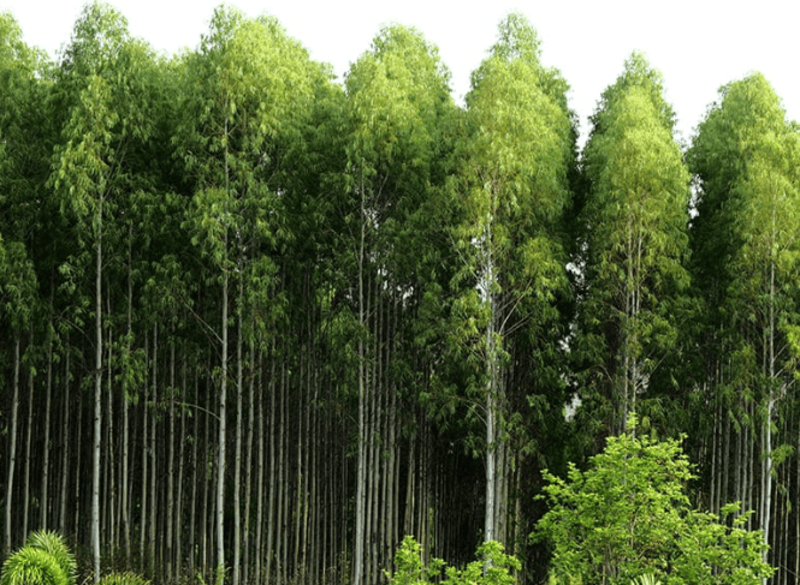Kenya fell six million eucalyptus trees in just six months despite conservation efforts

A report by the Kenya Forestry Research Institute (KEFRI) reveals that six million eucalyptus trees were felled between January and June 2024 for processed timber exports to China and India.
Kenya has lost an area of trees equivalent to five Karura forests within just six months, a situation that threatens President William Ruto's ambitious plan to plant 15 billion trees by 2032.
A report by the Kenya Forestry Research Institute (KEFRI) reveals that six million eucalyptus trees were felled between January and June 2024 for processed timber exports to China and India.
More To Read
- Government orders supermarkets, retailers to cease selling unregistered and counterfeit medicines
- State unveils Sh5 trillion infrastructure plan, JKIA upgrade and new airport to start in January 2026
- Speaker Kingi submits list of absentee landlord farms to Ruto for squatter resettlement
- President Ruto leads nation in mourning former Lugari MP Cyrus Jirongo
- Ruto honours Benni McCarthy, Harriet Okach for elevating Kenya’s sports profile
- JKIA–ABC road corridor to get new look as Ruto revives city roadworks
The report, presented to the National Assembly's Environment, Forestry, and Mining Committee, highlights how the trees, mostly aged five to six years, were converted into 60,000 tonnes of veneers. These exports were primarily driven by demand from the Asian economic giants.
"At an average spacing of three metres by three metres, six million trees would cover 11,720 acres. That's about half the size of Nairobi National Park or five times the area of Karura Forest," said KEFRI Acting CEO Jane Njuguna.
In response to mounting pressure from local timber manufacturers and the Kenya Association of Manufacturers (KAM), Environment Cabinet Secretary Aden Duale imposed a ban on immature eucalyptus harvesting and veneer exports earlier this year. However, investigations revealed ongoing operations in Chinese-owned veneer factories in Nyandarua and Kericho counties.
Efforts to reach Duale or Kenya Forest Service (KFS) Chief Conservator Alex Lemarkoko for comment were unsuccessful.
The indiscriminate harvesting of underage eucalyptus trees has far-reaching implications. KAM Chairperson Kaberia Kamencu highlighted the economic impact, noting that Kenya Power is struggling to source electricity poles.
"When we met the government in August, Kenya Power was already facing shortages. Now, South African suppliers are offering to step in. This raises critical questions about our resource management," Kamencu said.
KEFRI's report estimates that farmers earned Sh642 million from the veneer exports, far below the potential Sh8.6 billion they could have made if the trees were left to mature for 10 to 15 years.
If grown for 20 to 25 years, the value would have exceeded Sh11 billion.
"The farmers got easy money, but they could have earned much more while helping preserve the environment," Njuguna said.
Additionally, the large-scale deforestation has disrupted local ecosystems, increased wind speeds, and exposed soil to erosion, resulting in higher temperatures and flash floods in eucalyptus-growing regions.
The destruction of young trees has sparked fears of a wood product shortage in the next decade. "We have gone back to zero. It will take another 10 years for the sprouts to recover, leading to higher wood prices and significant shortages," Dr Njuguna warned.
The Timber Manufacturers Association expressed concern about the ripple effect on industries reliant on farmed forestry, including construction and furniture manufacturing.
"This confirms our fears that the unsustainable cutting of trees is doing more harm than good. We must assess the damage to all dependent industries," the association said.
The Ministry of Environment is drafting new regulations to control the exploitation of eucalyptus trees, including a proposed import-export guideline.
"We aim to stabilise our landscapes while using resources to foster economic transformation at the grassroots," said Acting Conservation Secretary, George Tarus.
However, stakeholders argue that the ban on veneer exports is a short-term solution. The Environmental Institute of Kenya (EIK) called for a more inclusive approach to sustainable forestry practices.
"The farmer has not been heard. Most eucalyptus trees grow on private land, and we need all stakeholders at the table to chart a way forward," said EIK Chairperson Alfred Mugambi.
KEFRI has identified alternative trees, including bamboo, pines, and cypresses for highlands, and acacia species for arid regions.
Njuguna recommended a national audit of eucalyptus farms to better inform policies and investments.
The 2022 Kenya National Bureau of Statistics report showed that forestry contributed Sh199.8 billion to the economy.
However, the rapid exploitation of young trees threatens this key economic sector.
Top Stories Today












































